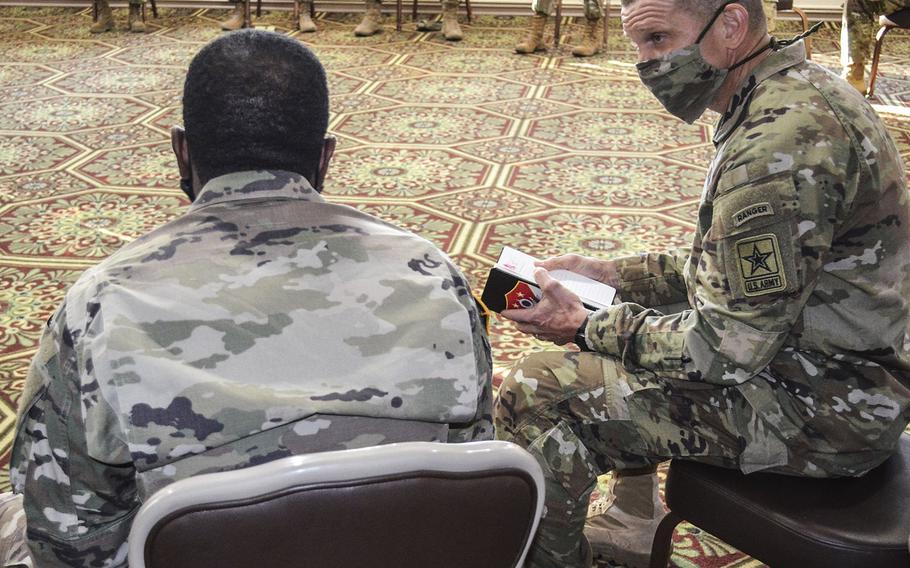
Sgt. Maj. of the Army Michael Grinston met Thursday with junior enlisted soldiers at Fort Hood, Texas, to discuss efforts to improve the base’s command climate and culture after an investigation released last month identified leadership failures and systemic problems. (Rose L. Thayer/Stars and Stripes)
FORT HOOD, Texas — Leaders responsible for Spc. Vanessa Guillen from her squad to her battalion were fired during the disciplinary action that took place last month at Fort Hood, Sgt. Maj. of the Army Michael Grinston told soldiers Thursday at the base.
Speaking to a group of about two dozen junior enlisted soldiers, Grinston used the firings as an example of how the Army is taking action to root out leaders who allow corrosive behavior to persist in the ranks.
Fourteen leaders faced disciplinary action following the Dec. 8 release of the Fort Hood Independent Review Committee report that found the command climate and culture problems at the base were a result of poor leadership. At the time, only action taken against leaders in positions at the brigade level and above were identified, in accordance with Army personnel privacy policy.
Leaders responsible for Guillen in her squad, platoon, company and battalion were also fired, Grinston said Thursday.
Previously announced firings in Guillen’s chain of command included Maj. Gen. Scott Efflandt, the deputy commander of III Corps who was the acting base commander at the time of Guillen’s disappearance and death, and Col. Ralph Overland and Command Sgt. Maj. Bradley Knapp, the commander and top enlisted soldier of Guillen’s unit, the 3rd Cavalry Regiment.
Maj. Gen Jeff Broadwater and Command Sgt. Maj. Thomas Kenny of the 1st Cavalry Division, which was not part of Guillen’s chain of command, were suspended following the report’s release, pending the results of a new investigation into the unit’s command climate and implementation of a sexual assault prevention program.
Guillen, who served as a small arms repairer in the regiment’s engineer squadron, went missing from the base in April. During the more than two-month search for her, questions arose about the efforts to find her, the conditions at the base, and its sexual assault and harassment program. Investigators found her body June 30 and determined a fellow soldier, Spc. Aaron Robinson, killed Guillen with a hammer in an arms room, then buried her body about 20 miles from the base.
In July, Army Secretary Ryan McCarthy announced the civilian review committee, which found Fort Hood to have an environment “permissive” of sexual assault and harassment and lacking trust between soldiers and leaders.
Further disciplinary action could follow the findings of an ongoing internal Army investigation into the actions of every level of the command related to all aspects of the Guillen case. Led by Gen. John Murray, commander of Army Futures Command, a public release date on his findings has not been announced.
Fort Hood’s commander, Lt. Gen. Pat White, returned from a yearlong deployment in September and initiated a “people first” training program to improve trust between soldiers and leaders. The program included a weeklong break from field training to allow leaders to sit down with soldiers and get to know them on a personal level, talk with their families and visit their living quarters.
Grinston visited Fort Hood on Thursday to hear from soldiers about these efforts. Stars and Stripes was permitted to listen to a discussion with junior enlisted soldiers, with the agreement the participants would not be named.
The soldiers were all members of the 3rd Cavalry Regiment and 1st Cavalry Division and many of them said they appreciated the additional training because it felt more genuine than in the past. However, some of them still asked for deeper relationships built outside of Army requirements. They suggested having more teambuilding exercises, small group physical training and friendly competitions.
It was during these discussions that Grinston explained last month’s firings at Fort Hood. He said leaders can’t take action on problems that they don’t know about and he encouraged soldiers to report misconduct in the ranks.
Many soldiers spoke candidly and, when asked, told Grinston that they believed he was there only to “check the box,” and they didn’t believe the initiatives taking place at Fort Hood now would last.
“The whole U.S. is watching Fort Hood. They want to see you here,” said one soldier.
But another solider said Grinston seemed genuine.
“Most people don’t ask us questions,” she said. “You asked. I think you care.”
“I appreciate your honesty,” Grinston told the group. “There’s a lot going on in the world right now … but I’m here. I don’t want to go back to what it was three months from now.”
thayer.rose@stripes.com Twitter: @Rose_Lori